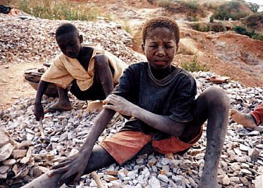Pro-poor social protection and intervention programs are by themselves not sufficient to adequately combat the perpetual menace of incidents of Worst Forms of Child Labor (WFCL) the Participatory Development Associates (PDA), has stated.
As a matter of urgency, the government and other stakeholder institutions must in addition to these programs, strengthen educational outcomes of children, especially the most vulnerable, by leveraging on existing social programs geared at providing free and compulsory education for all children, if there is to be sustained progress in eradicating incidents of forced child labor and modern-day slavery.
Despite the modest progress the nation has witnessed in tackling the phenomenon, it was noted that, “Ghana is not on course and may miss out on the agenda 2025 of eliminating all forms of child labour from production activities.” Furthermore, there is the risk of missing out on about 8 interlinked goals of the Sustainable Development Goals (SDGs) by 2030.
This was contained in a recently released PDA report on the state of child protection in Ghana.
Whilst the report underscored the impact pro-poor intervention programs such as the Livelihood Empowerment against Poverty (LEAP) and Free Compulsory Universal Basic Education (FCUBE) and recently Free Secondary Education (FSE) agenda had made, it argued that they were insufficient in tackling to root cause as, “poverty has proven to be a major barrier to fighting child exploitation, especially at the family and household levels.”
Drawing extensively from a number of empirical studies, it was established supply-side interventions such as education have much greater impact on reducing incidents of child labour and modern-day slavery than interventions based on resource transfers such as cash transfers and income generating or micro-entrepreneurial activities.
Highlighting the success chalked in some other developing nations where incidents of child labour were once rampant, it was noted that expanding access to education and improving school quality has been an important factor in making the current generation of parents appreciate the benefits of schooling, as they see that the long-term return-on-investment on education far outweighs the present value of labour that could be derived from their children.
Furthermore, the report recommended a strengthening of legal enforcement through resourcing relevant institutions such as the police and the Department for Social Welfare to carry out surveillance, rescue and prosecution duties to protect children from exploitation and to deter perpetrators from continuing the act.
The agriculture sector accounts for the highest number of abuses, particularly the cocoa and fishing industries, with a conservative estimate of 21,000 children said to be enslaved in the fishing industry along Lake Volta alone.










